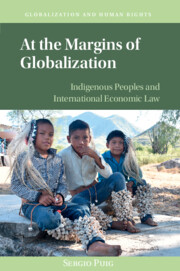Book contents
- At the Margins of Globalization
- Globalization and Human Rights
- At the Margins of Globalization
- Copyright page
- Dedication
- Contents
- Tables
- Preface and Acknowledgments
- Introduction
- 1 Globalization and Its Multiple Discontents
- 2 The Process of Susceptibility and Exclusion
- 3 Indigenous Peoples under International Economic Law
- 4 The Experience of Indigenous Peoples under Economic Regimes
- 5 The Recalibration of Indigenous Rights and Economic Law
- 6 Indigenous Interests and the Future of Economic Treaties
- 7 Toward an Indigenous-Based Critique of Globalization
- Conclusion
- Index
- Series page
3 - Indigenous Peoples under International Economic Law
Published online by Cambridge University Press: 23 April 2021
- At the Margins of Globalization
- Globalization and Human Rights
- At the Margins of Globalization
- Copyright page
- Dedication
- Contents
- Tables
- Preface and Acknowledgments
- Introduction
- 1 Globalization and Its Multiple Discontents
- 2 The Process of Susceptibility and Exclusion
- 3 Indigenous Peoples under International Economic Law
- 4 The Experience of Indigenous Peoples under Economic Regimes
- 5 The Recalibration of Indigenous Rights and Economic Law
- 6 Indigenous Interests and the Future of Economic Treaties
- 7 Toward an Indigenous-Based Critique of Globalization
- Conclusion
- Index
- Series page
Summary
States, international organizations and private businesses have distinct but complementary duties concerning human rights. States are obligated to respect, protect and fulfill human rights within their jurisdiction. International organizations are obligated to ensure that their activities, suc as financing infrastructure or peacekeeping in conflict zones, conform with (and in some cases protect) human rights. Business actors may not have the same responsibility as states or international organizations. For decades we have seen an increase in the number and in the development of frameworks that encourage economic globalization. We have also observed a similar path in the expansion of the international law frameworks that protect human rights, including indigenous human rights. Despite the growth of the two fields, both have developed separately, almost independently, although the two are fundamental to international law and a reflection of the world, especially after World War II (WWII). Frameworks regulating economic globalization have invariably lacked mechanisms of accountability on human rights.
Keywords
- Type
- Chapter
- Information
- At the Margins of GlobalizationIndigenous Peoples and International Economic Law, pp. 36 - 81Publisher: Cambridge University PressPrint publication year: 2021

